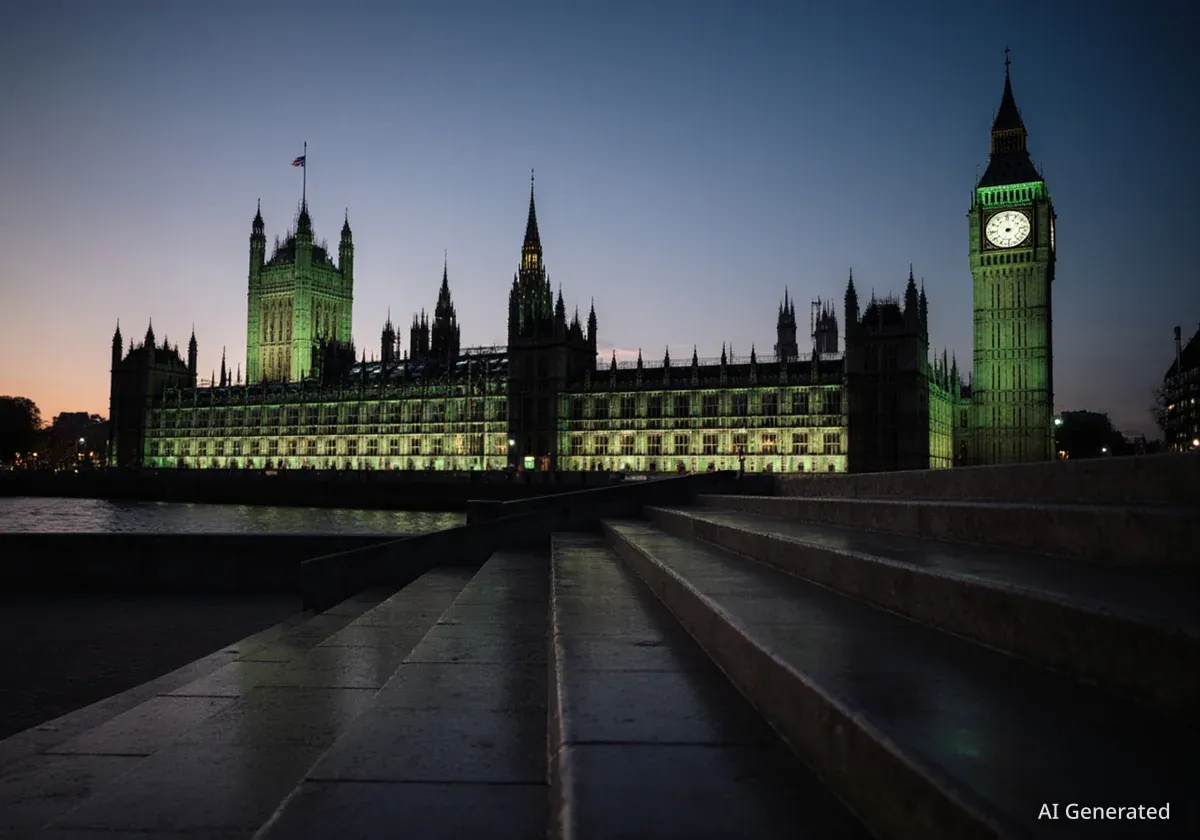Recent developments in Swiss federal politics include revelations about media companies funding a pro-E-ID campaign, a new initiative to recognize Palestine as a state, and public demand for stricter regulations on UBS. These topics highlight ongoing debates within the Swiss political landscape.
Key Takeaways
- Media companies Ringier and TX Group provided non-monetary support to the pro-E-ID campaign.
- An initiative for Switzerland to recognize Palestine as a state is moving forward.
- The Swiss public strongly supports tougher capital rules for UBS.
- The army plans to acquire new drone defense systems following increased sightings in Europe.
- A court ruling grants access to federal cloud contracts with Big Tech firms.
Media Companies Funded E-ID Campaign
Two major Swiss media groups, Ringier and TX Group, provided significant non-monetary contributions to the 'Alliance Pro E-ID' campaign. This happened shortly before the September 28 vote on the E-ID initiative. The contributions, totaling 163,000 Swiss Francs, were listed in the Federal Audit Office's transparency tool.
These contributions were in the form of free advertisements for the 'Yes' campaign. The pro-E-ID side received free ad space online and in print. This included platforms like '20 Minuten', Tagesanzeiger.ch, 'Der Bund', Blick.ch, and 'Der Beobachter'. The 'No' campaign did not receive a similar offer.
Campaign Funding Details
- Total Value: 163,000 Swiss Francs
- Contributors: Ringier and TX Group
- Recipient: Alliance Pro E-ID
- Form of Contribution: Free online and print advertisements
Queries to the media companies revealed their involvement. TX Group and Ringier are members of Digitalswitzerland, a business association that actively supported the 'Yes' vote. Ringier CEO Marc Walder also personally campaigned for the 'Yes' vote on social media, similar to the 2021 E-ID vote.
TX Group confirmed that they only offered free platforms to the 'Pro' campaign. Ringier responded with caution, stating that "granting discounts on political advertising is common practice in the industry." They also maintained that the editorial independence of Ringier media remained intact.
"When a media company becomes politically involved, it should explain why it does so. It should also clarify how editorial independence is still guaranteed."
Linards Udris, Media Scientist, University of Zurich
The 'No' committee expressed anger. Campaign manager Monica Amgwerd stated: "When media groups become parties in votes, they undermine their democratic function." The organization Mass-voll filed a second electoral complaint with the Canton of Zurich regarding this issue. The narrow outcome of the vote, with 50.4 percent 'Yes' votes, makes the media's involvement particularly notable.
Army Boosts Drone Defense
The Swiss Army has tasked the Federal Office for Defense Procurement (Armasuisse) with acquiring defense systems against micro and mini-drones. This move aims to protect troops and critical infrastructure. The decision follows an increase in foreign drone sightings over European territory.
Since early September, drones have been spotted in nine European countries. These include Poland, Germany, and France. Some sightings were definitively linked to Russia. Several airports temporarily closed operations due to drone activity. Poland and NATO partners shot down drones after 19 of them entered Polish airspace. Some governments accuse Russia of hybrid warfare, possibly testing NATO's capabilities and Western reactions.
European Drone Activity
The recent increase in drone sightings across Europe has raised security concerns. Incidents have led to operational disruptions at airports and calls for stronger defense measures. This trend suggests a potential shift in geopolitical tactics, prompting nations to re-evaluate their aerial security protocols.
Armasuisse has established a task force. This group will determine the specific requirements for such a defense system. The challenge lies in finding a system effective against many types of drones. Drone technology is advancing rapidly, making this a complex procurement process.
New Initiative for Palestine Recognition
A civil society committee is preparing to launch an initiative for Switzerland to recognize Palestine as a state. Research by West Swiss broadcaster RTS indicates that the Federal Chancellery has approved the initiative text. This marks a significant step towards a public vote on the matter.
In late September, countries like Great Britain, Canada, Australia, and France joined the majority of nations that recognize Palestine as a state. Their aim is to pressure Israeli Prime Minister Benjamin Netanyahu towards peace with Palestinians and a two-state solution. The conflict in the Gaza Strip has lasted two years. Many genocide researchers describe it as genocide.
Despite international trends, both the Swiss Federal Council and a parliamentary majority (SVP, FDP, Centre Party, and GLP) oppose recognition. The initiative committee seeks to use a popular vote to compel the government to take this step. According to RTS, signature collection could begin this month. The committee has 18 months to gather the necessary 100,000 signatures.
Transparency Win: Federal Cloud Contracts Released
The Bern News Today has gained access to public cloud framework agreements with five major tech companies: Microsoft, Alibaba, Amazon, Oracle, and IBM. In 2023, the Bern News Today filed a public access request with the federal administration for these documents. Amazon appealed the Federal Chancellery's decision, blocking access to all five contracts.
This summer, the Federal Administrative Court ruled in favor of the Bern News Today. Amazon has not appealed this ruling, making the decision legally binding. The Federal Chancellery awarded contracts to these five American and Chinese Big Tech firms in 2021 for public cloud operations. Due to public and political outcry, federal offices were cautious in using these cloud services.
- The customs office uses Amazon services for its applications.
- The Federal Office of Public Health runs various programs on Microsoft.
In September 2025, the Federal Chancellery decided to extend these framework agreements for another five years. The Geneva IT company Infomaniak has filed a complaint against this extension. Access to these documents is vital. The contracts outline data protection, liability, IT security, and jurisdiction. Transparency in these areas provides legal certainty for the Swiss population.
Starting October 20, the Federal Chancellery will release redacted framework agreements for four Big Tech companies to the Bern News Today. The case of Bern News Today versus Amazon will continue separately. This ongoing process seeks to gain full access to Amazon's contract details. Analysis of these contracts is also important for the upcoming Swiss Government Cloud tender.
Public Demands Stricter UBS Regulations
A recent survey shows that the Swiss public wants stricter capital requirements for the major bank UBS. This is true even if UBS claims its rules are already tougher than those abroad. 61 percent of approximately 24,000 respondents in a Leewas Institute survey for "20 Minuten" and Tamedia support this view.
The Federal Council aims to stabilize the Swiss financial sector. To achieve this, it plans to tighten capital rules for UBS, the country's last remaining major bank. The current proposal is less stringent than earlier versions. It only requires UBS to back its foreign subsidiaries with more capital. However, UBS opposes these changes. The bank threatens to move operations abroad if the rules become too strict.
UBS Regulation Survey Results
- 61% of respondents want stricter capital rules for UBS.
- 65% believe UBS moving abroad would harm Switzerland.
- Survey conducted by Leewas Institute for "20 Minuten" and Tamedia.
- Approximately 24,000 people participated.
A majority of survey respondents also believe that UBS moving abroad would be a loss for Switzerland (65 percent). On November 3, the National Council's Economic Affairs Committee will discuss the Federal Council's reform proposal. UBS CEO Sergio Ermotti and Finance Minister Karin Keller-Sutter will be questioned on the same day.
Federal Migration Office Clarifies Citizenship Policy
Switzerland defines citizenship by passport ownership, not by origin or religion. However, this principle of the liberal federal state appears to be unclear to some in the State Secretariat for Migration (SEM). SP National Councillor Céline Widmer filed an interpellation stating that SEM requested applicants to provide references who were "citizens by descent" with supposedly Swiss-sounding names.
The SEM has distanced itself from this practice in a statement to the "Tages-Anzeiger." The office informed its employees that this practice is not permitted. This clarification reinforces the inclusive nature of Swiss citizenship law.




